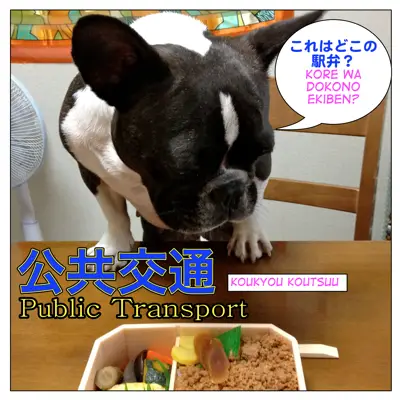
「これ、どこの駅弁?」
= Kore, doko no ekiben?
= Where did you get this railway lunch box?
無断転載禁止(All rights reserved)
Hi everyone!
Today I will teach you some travel related lesson. Hopefully, you’ll find this lesson helpful when you come to Japan to visit — especially when you use public transport.
![]() Basic vocabulary:
Basic vocabulary:
*鉄道 = tetsu dou = railroad, railway
*電車 = den sha = (electric) train
*列車 = ressha = railway train
*普通列車 = fu tsuu ressha = local train
*急行列車 = kyuu kou ressha = express train
*特急列車 = tokkyuu ressha = limited express train
*快速列車 = kai soku ressha = rapid-transit train
*新幹線 = shin kan sen = bullet train
*上り(列車)= nobori (ressha) = up-trains, inbound line, trains going towards, trains going toward the capital (Tokyo)
*下り(列車)= kuda ri (ressha) = down-trains, outbound line, rains going away from the capital, (Tokyo)
*JR = jeiaaru= Japan Railway service
*私鉄 = shi tetsu = Private Railway
*〜線 = ~ sen = ~ Line
Ex. 東海道線 = Tou kai dou sen= Toukaidou Line
Ex. JR線 = JR sen = JR(Japan Railway) Line
Ex. 山手線 = Yamanote sen = Yamanote Line
Ex. 在来線 = zai rai sen = the conventional railway line
Ex. 東京駅に行くには何線に乗らなければいけませんか?
= Toukyou eki ni iku niwa nanisen ni noranakareba ikemasen ka?
= Which line should I take to get to Tokyo station?
*******
*駅 = eki = station
*ホーム = hoomu = platform
(←プラットホーム = puratto hoomu)
*改札口 = kai satsu guchi = ticket gate
*乗り場= のりば = noriba = place to board / ride a vehicle
*(number) + 番線 ( = bansen) = Track No.〜
********
*切符 = kippu = ticket (in general)
*乗車券 = jou sha ken = passenger ticket
*普通乗車券 = fu tsuu jou sha ken = (regular) passenger ticket / Basic fare ticket
*指定券=shiteiken = reserved-seat ticket
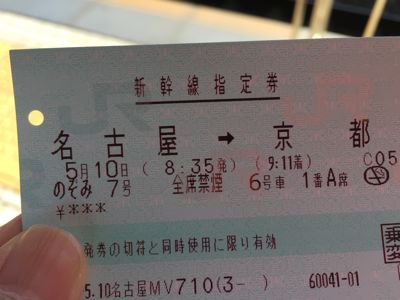
*特急券 = to kyuu ken = the ticket for a special express, Limited express ticket
(You need this ticket besides regular 乗車券=joushaken= basic fare ticket)
Note: A station staff member may come to your seat to check your ticket. He’ll say:
Ex. 乗車券、特急券を拝見致します。
= Joushaken, Tokyuuken wo haiken itashimasu.
= I would like to see your passenger ticket and limited express ticket.
*片道乗車券/切符 = kata michi jou sha ken / kippu = one way ticket
*往復乗車券/切符 = ou fuku jou sha ken / kippu = round-trip ticket
*回数券 = kai suu ken = a coupon ticket
*3ヶ月有効 = sankagetsu yuukou = valid for three month
*料金 = ryoukin = fare (in general)
*運賃 = unchin = fare, transport cost
*往復料金 = ou fuku ryoukin = fare for round trip
*子供料金 = ko domo ryoukin = fare for children
*割引料金 = wari biki ryoukin= discount fare
*切符販売機 = kippu hanbaiki= ticket machine
*自動券売機 = jidou kenbaiki= automatic ticket vending machine
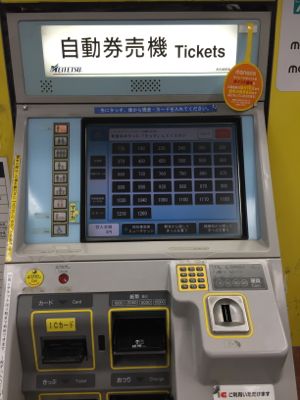
*切符売り場 = kippu uri ba = ticket office
********
*路線図 = ro se nzu = route map
*時刻表 = jikokuhyou = time table
********
What to do you call the first / last train of the day
Every railway company has its name for the first/last train of the day but here are the basic ones.
*終電 = shuu den / 最終列車 = sai shuu ressha = last train
*始発 = shi hatsu / 初発 = shohatsu/ 始電 = hatsuden / 一番列車 = ichiban ressha = the first train
*行き先 = iki saki=destination
*〜行き = ~ iki = bound for
*~方面 = ~ houmen = For ~
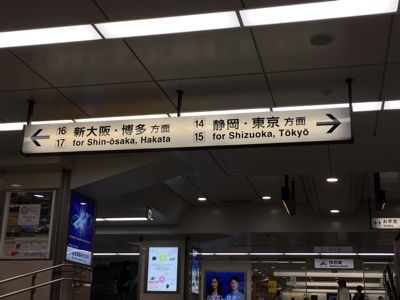
*乗り換え = norikae = changing trains / buses
Ex. どこで乗り換えをしたらいいですか?
= Doko de norikae wo shitara ii desuka?
= Where should I transfer?
It is also important to understand how people give you directions.
Ex. ここから3つめの駅です。
= Koko kara mittsume no eki desu.
= It’s the third stop from here.
Ex. 次の駅で降りてください。
= Tsugi no eki de orite kudasai.
= Please get off at the next station.
Ex. 新宿で山手線に乗り換えてください。
= Shinjuku de Yamanotesen ni norikaete kudasai.
= Please change to Yanote Line and at Shinjuku (station).
*途中下車 = tochuugesha = stopover
*一日乗車券 = ichinichi jousha ken = one day travel pass
*定期券 = teikiken = commuter pass
*窓口 = madoguchi = ticket selling window
*車両 = sharyou = train car
* Number + 号車 = gousha = No. ~ train car
*****
*座席指定 = zaseki shitei = reserving a seat
*指定席 = shiteiseki = reserved seat
*自由席 = jiyuuseki = non-reserved seat
*座席 = zaseki = seats
*普通座席 = futsuu zaseki = standard seat
*グリーン車 = guriin sha = (Special) Green seats (The first class)
*新幹線 ( = shinkansen), bullet train, has three kinds.
* のぞみ = Nozomi = the fastest train
*ひかり = Hikari = the second fastest train
*こだま = Kodama = The slowest train among three
![]() How to book train tickets.: 予約 (= yoyaku) reservation
How to book train tickets.: 予約 (= yoyaku) reservation
If you are going to visit Japan as a tourist, I highly recommend the Japan Rail Pass. It is only valid for temporary visitors.
It is possible to buy tickets online if you travel with JR East. (Currently you cannot buy all the train tickets online in Japan.) or at any major travel agencies.
But if you need to go buy tickets at the station,you can buy tickets with a vending machine.
*自動販売機=jidou hanbaiki=vending machine (in general)
*自動券販売機=jidou ken hanbaiki = automatic ticket vending machine
*指定券売機=shitekenbaiki = reserved seat vending machine
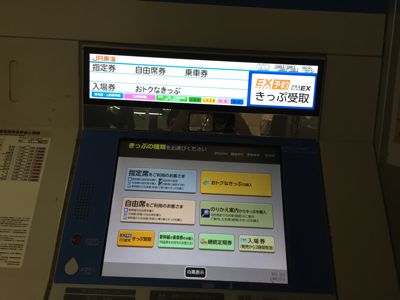
many stations have a special ticket office called
*JR全線チケット売り場 ( = JR Zensen chiketto uriba) JR the all Lines Tickets office

or
*みどりの窓口 (= Midori no mado guchi ) (The literal translation is) Green window
Now let’s learn how to buy 新幹線 (= Shinkansen) bullet train ticket here.
It will be easier if you check the time and the name of the train in advance.
Ex. 7月1日、東京発10:10、京都行き、のぞみ23の切符を2枚下さい。
= Hichigatsu tsuitachi, Toukyou hatsu, juuji juppun, Kyouto iki, Nozomi nijuusan no kippu wo nimai kudasai.
= I would like two seats on Nozomi 23 leaving at 10:10 leaving Tokyo on July 1st to Kyoto.
There are train seat reservation form at tickets office. You can just fill this out and hand it over at the window.
乗車券、特急券申込書= joushaken, tokyuuken moushikomisho = application for regular basic fare ticket and limited express ticket.
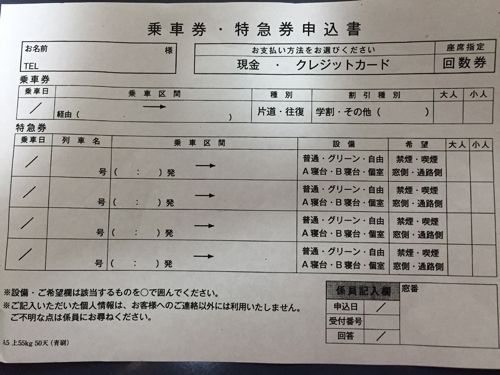
If you are not sure about the time schedule you can ask them to help you find the right train:
B: お時間のご希望は?
= Ojikan no gokibou wa?
= Yes, what time would like (to leave)?
Ex. 朝、9時頃がいいです。
= Asa, kujigoro ga ii desu.
= I would like around 9:00 one.
Ex. 朝10時頃に東京を出たいです。
= Asa juuji goro ni Toukyou wo detai no desu.
= I would like to leave Tokyo around 10:00 a.m.
Ex. 昼の1:00には京都に着いていたいのですが。
= Hiru no ichiji niwa Kyouto ni tsuite itai no desu ga.
= I would like to arrive in Kyoto by 1:00 p.m.
Note: You often leave the sentence unfinished, saying のですが (=nodesuga)
Ex. 1時ののぞみはもう満席となっております。
= Ichiji no Nozomi wa mou manseki to natteorimasu.
= The 1:00 Nozomi is already full.
Ex. もっと早い/遅い新幹線はありますか?
= Motto hayai/osoi shinkansen wa arimasuka?
= Do you have an earlier / later bullet train?
Ex. お席はこちらからお選び頂けます。
= Oseki wa kochira kara oerabi itadakimasu.
= You can choose your seats from here.
Ex. 隣同士の席をお願いします。
= Tonaridoushi no seki wo onegai shimasu.
= We would like to sit next to each other
Ex. 通路側をお願いします。
= Tsuuro gawa wo onegai shimasu.
= I’d like an aisle seat please.
*通路側(の席)= tsuuro gawa (no seki) = aisle seat
*窓側(の席)= madogawa (no seki) = window seat
Ex. グリーン車でお願いします。
= Guriin sha de onegai shimasu.
= With first class please.
Ex. グリーン車だとおいくらになりますか?
= Guriinsha dato oikura ni narimasuka?
= How much would be if I travel in first class?
Ex. 自由席でいいです。
= Jiyuuseki de iidesu.
= I will be just fine with no-reserved seat.
Note: If you travel during peak times or during holidays, it would be safer to book your seat, but if it is off peak time or weekdays, you could travel in no-reserved seats.
→自由席 = jiyuuseki = no-reserved seats. They are less expensive so the number of seats are limited.
Usually Cars 1~3 or 1~4 are designated as non-reserved seating.
You have to stand in line for a certain number of cars.
******************
:s: Subway, bus, local trains
*地下鉄 = chikatetsu = subway
Some area may has its way of calling the subway by its owned company
Ex. 東京メトロ = Tokyou metoro = Tokyo Metro
*バス = basu = bus
*市バス = Shibasu= city bus
*都営バス = Toei basu= bus service run by Tokyo
Every bus service has different way of paying.
![]() (料金)前払い = ( ryoukin) maebarai = to pay when you get on the bus
(料金)前払い = ( ryoukin) maebarai = to pay when you get on the bus
![]() (料金)後払い = ( ryoukin) atobarai = to pay when you get off the bus (You have to get a ticket when you get in the bus.)
(料金)後払い = ( ryoukin) atobarai = to pay when you get off the bus (You have to get a ticket when you get in the bus.)
*地下鉄(の)駅 = chikatetsu (no) eki = subway station
*バス停 = basutei = bus stop
(←バス停留所 = basu teiryuujo )
Ex. このバスは東京駅まで行きますか?
= Kono basu wa Toukyou eki made ikimasuka?
= Does this bus goes to Tokyo Station?
Ex. 東京駅までどのぐらいかかりますか?
= Toukyou eki made donogurai kakarimasu ka?
= How long does it take to get to Tokyo Station?
In case you miss pressing a buzzer, tell 運転手 (= untenshu ) a driver
Ex. すみません。降ります。
= Sumimasen. Orimasu.
= I’m getting off.
If you are not sure where to get off the bus, you can ask a driver or other passengers,
Ex. 駅に着いたら教えて頂けますか?
= Eki ni tsuitara oshiete itadakemasuka?
= Could you tell me when we get to the station?
Ex. 平安神宮に行くにはどこで降りたらいいですか?
= Heian Jinguu ni iku niwa doko de oritara ii desu ka?
= Where should I get off in order to go to Heian Jinguu (Shrine)
Ex. 京都駅行きのバスは何番ですか?
= Kyouto eki iki no basu wa nanban desuka?
= Which number of the bus I should take to go to Kyoto Station?
Ex. このバスは金閣寺まで行きますか?
= Kono basu wa Kinkakuji made ikimasu ka?
= Does this take me to Kinkakuji temple?
*優先席 = yuusenseki = priority seat
Some subways set a time period (or all day long in some area)
![]() 女性専用車両 = josei senryou sharyou = women-only carriage on a train
女性専用車両 = josei senryou sharyou = women-only carriage on a train
so be careful if you are the only man on the carriage on a train. You might get stared at.
*出口 = deguchi= Exit
Ex. 代々木公園に行くにはどの出口が一番近いですか?
= Yoyogi kouen ni iku niwa dono deguchi ga ichiban chikai desuka?
= Which exist is the closest to Yoyogi park?
Ex. 各駅停車
= kakueki teisha
= stopping at every station
*回送 = kaisou = deadhead (train/subway/bus)
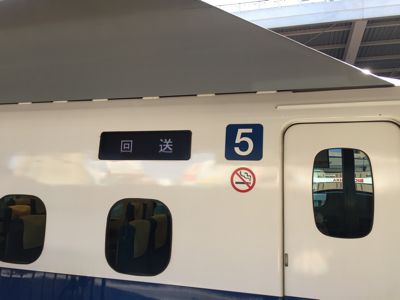
*発車 = hassha= departure
Ex. 発車します
= Hassha shimasu.
= We are leaving now.
*出発 = shuppatsu = departure
Ex. 出発時間/時刻=shuppatsu jikan/ jikoku= departure time
*到着 = touchaku = arrival
Ex. 到着時間/時刻 = ouchaku jikan jikoku = arrival time
:ii: 駅のアナウンス = Eki no anaunsu = Announcement at the station
You can try listening to the announcements at the station or on the train.
Ex.3番線より小田原行きの列車が発車致します。
= Sanban sen yori Odawara iki no ressha ga hassha itashimasu.
= The train for Odawara will leave from Track No.3.
Ex. まもなく1番線に10:30発小田原行きの列車が到着致します。
= Mamonaku ichiban sen ni juuji sanjuppun hatsu Odawara iki no ressha ga touchaku itashimasu.
= The 10:30 train for Odawara will arrive on track No.3 soon.
Ex. 白線まで下がってお待ち下さい。
= Hakusen made sagatte omachi kudasai.
= Please stand behind the white line.
Ex. 自由席は1号車から4号車までです。
= Jiyuuseki wa ichigousha kara yongosha made desu.
= Cars 1 through 4 are for passengers without seat reservations.
Ex.こちらは大阪行きのひかり号です。途中、名古屋、京都に停車致します。
= Kochirawa Osaka iki no hikarigou desu. Tochuu, Nagoya, Kyouto ni teisha itashimasu.
=This is the Hikari Super Express bound for Osaka. It will be stopping at Nagoya and Kyoto before arriving Osaka.
Ex. 禁煙車両ではデッキでのお煙草もご遠慮ください。
= Kinen sharyou dewa dekki deno otabako mo goenryo kudasai.
= Please refrain from smoking in the areas at either end of the non-smoking cars.
Ex. 携帯電話ご使用についてお願いを致します。携帯電話ご使用はデッキでお願い致します。
= Keitai denwa goshiyou ni tsuite onegai wo itashimasu. Keitai denwa goshiyou wa dekii de onegai itashimasu.
= We ask that portable phones be used only in the areas at either end of each car.
You may not be able to understand the whole thing but try to catch some important words.
*運転見合わせ = unten miawase = the service is (has been) suspended
*運休 = unkyuu = to be cancelled
*人身事故 = jinshin jiko = the accident with casualties
*停車 = teisha = stopping a train, bus, subway
Ex. 3分間停車致します。
= Sanpunkan teisha itashimasu.
= We will stop (at the station) for three minutes.
!onpu! Cultural Note: IC card
Every big city has its own special IC transportation cards such as 「Kitaca」「PASMO」「TOICA」「manaca」「ICOCA」「PiTaPa」「SUGOCA」「nimoca」「はやかけん = Hayakaken」throughout Japan.
You need to charge a certain amount of money, and it is a bit complicated to buy one the first time with a machine but if you are planning to live or stay in Japan for a long time, it will come very handy. Once you buy one and if you put enough money you can use it wherever you travel and you can even use it at a convenience stores or vending machines at a station.
*****
From the picture:
「これ、どこの駅弁?」
= Kore, doko no ekiben?
= Where did you get this railway lunch box?
駅弁 (= ekiben) is a railway boxed meal which you can buy on the train or at stands on the platform or inside the station.
There is a great variety of ekiben and every station has its own special meal using the local cuisine.
If you get a chance to travel around Japan by train, be sure to try one or two.
*****
 マギー先生より = Maggie Sensei yori = From Maggie Sensei
マギー先生より = Maggie Sensei yori = From Maggie Sensei
これから旅行をするにはいい季節ですよ。
= Kore kara ryokou wo suru niwa ii kisetu desuyo.
どこかに旅行いったら、美味しい駅弁を買ってきてね。
= Dokoka ni ryokou ni ittara, oishii ekiben wo katte kitene.
= If you travel somewhere, please buy me delicious “ekiben”
***
Will you be my Patron?
I appreciate your support! サポートありがとう!

14 Comments
Maggie 先生! Thank you for your various lessons – I’m heading to Japan soon and am very excited and very thankful for your useful phrases. I have a question to ask – I will be using the Kansai One Pass while in Kansai, which is refundable with a handling fee. I intend to ask for a refund when I leave Kansai but am not sure how I should do this. Is it okay to take the card to the ticket station and say “返品がしたいです”? Thank you again for your help!
@Nicole
Hi Nicole,
Wow, you are coming to Japan. How exciting!
Kansai One Pass is relatively a new pass.
Here is the details of the pass. You can check the locations where you can get/refund the pass.
You tell them,
デポジットの返金お願いします。(Depozitto no henkin onegai shimasu.)
They will charge 手数料(てすうりょう)handling fee from the deposit.
Have a nice trip!
Sensei could you explain how to ask a station master/someone if certain trains/bus are covered by a travel pass?
For example,
Will this bus that go to Motosuko lake fee is covered by Fuji-Hakone pass?
Thank you for your time! !heart3! !heartsippai! !heart3!
@Jane
Hi Jane,
There are many ways to ask that question but
first
富士箱根周遊券= Fuji Hakone Shuuyuuken = Fuji Hakone pass
本栖湖= Motosuko (Lake)
~ 行きのバス=~ iki no basu = a bus that goes to ~
使えますか?= Tsukaemasu ka? = Can I use
乗れますか? = Noremasu ka? = Can I get on
Basic pattern:
(destination ) iki no basu wa ( Pass ) ga tsukaemasu ka? (Can I/we use ~ pass for the bus to (destination) )
(destination ) iki no basu wa ( Pass ) de noremasu ka? (Can I/we get on a bus that goes to (destination)
Motosuko iki no basu wa Fuji-Hakone shuuyuuken de noremasu ka?
Motosuko iki no basu wa FUji-Hankone shuuyuuken ga tsukaemasu ka?
Great information here, as always.
Sometimes when I’m coming home from Tokyo, the local train waits at a station for the rapid or commuter rapid train. What do you call this in Japanese and what does the conductor announce to the passengers? They say it so fast, I can’t understand the words
@アル
Hi アル!
I know the announcement at the station is very fast and hard to hear.
I hope I got your question but you want to know what the announcement says when a local train has to wait for the rapid train passes at the station?
If so, they are probably saying something like
特急列車通過待ちをいたします
= Tokyuu ressha tsuukamachi wo itashimasu.
!niconico! I hope sometime I can go to Japan, Soshite mottomo hayai densha to iu shinkansen ga noseru
@Bahasajepang
Hi Bahasajepang
Thank you for mentioning us on your site!
Hope you get to come to Japan,too!
(Will help your Japanese a little. I think you meant….Soshite mottomo hayai shinkansen toiu densha ni noritai desu.)
As always thank you for the lessons !JYANE!
Today the kanji’s are a little daunting !BOO!!
@iza
Haha, don’t worry about all the kanji so much.
But it will help if you recognize some of them, such as 方面=houmen= For (destination) / ~ 線(=sen) ~ Line, etc.
がんばって!
Hello :tulip3:
I’ve just found you blog and it looks totally 面白い!
Now it’s almost midnight so I go to sleep soon, but I will definitely go back to you tomorrow :-D
Have a nice day
@Hanna
Hello Hanna!
Welcome to our site!
There are many lessons here. Hope you come back here again and again. :)
I love every lesson you’ve made Sensei. :-)
@John
Thank you!!! ありがとう! boucingheart!